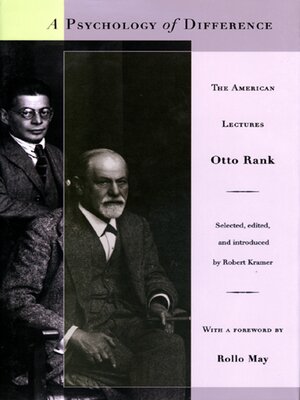
Sign up to save your library
With an OverDrive account, you can save your favorite libraries for at-a-glance information about availability. Find out more about OverDrive accounts.
Find this title in Libby, the library reading app by OverDrive.



Search for a digital library with this title
Title found at these libraries:
| Library Name | Distance |
|---|---|
| Loading... |
A leading disciple and confidant of Freud, Otto Rank revolutionized the field of psychoanalytic theory in The Trauma of Birth (1924). In this book, Rank proposed that the child's pre-Oedipal relationship to the mother was the prototype of the therapeutic relationship between analyst and patient. Although Rank is now widely acknowledged as the most important precursor of humanistic and existential psychotherapy—influencing such well-known writers as Carl Rogers, Rollo May, and Ernest Becker—Rank's knotty prose has long frustrated readers. In this volume of Rank's lectures, Robert Kramer has brought together for the first time the innovator's clearest explanations of his most influential theories.
The lectures were delivered in English to receptive audiences of social workers, therapists, and clinical psychologists throughout the United States from 1924 to 1938, the year before Rank's untimely death. The topics covered include separation and individuation, projection and identification, love and will, relationship therapy, and neurosis as a failure in creativity. The lectures reveal that Rank, much maligned by orthodox analysts, invented the modern object-relations approach to psychotherapy in the 1920s. In his introduction, based on private correspondence between Rank, Freud, and others in the inner circle, Robert Kramer tells the full story of why Rank parted ways with Freud. The collection of lectures constitutes a "readable Rank," filled with insights still relevant today, for those interested in the humanistic, existential, or object- relational aspects of psychotherapy, or in the development of the psychoanalytic movement.







